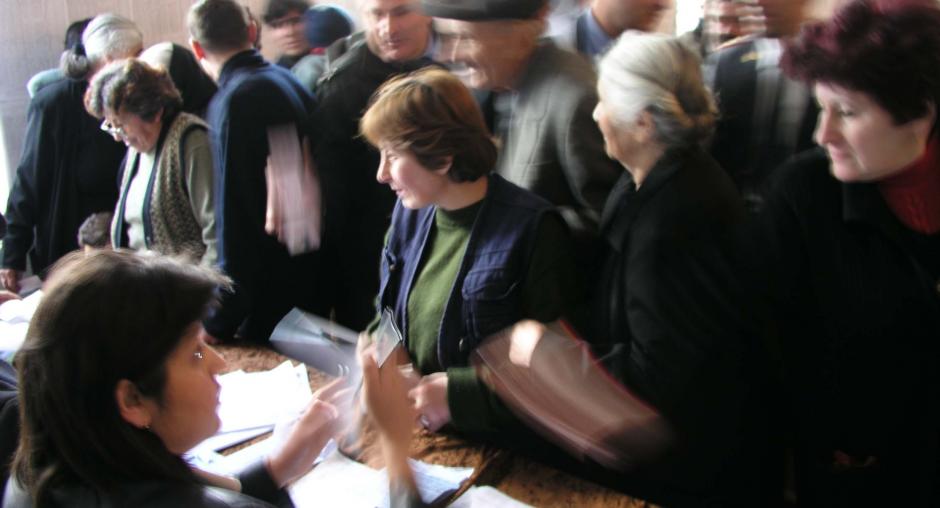Newsroom
Georgia election a chance for new authorities to show commitment to democracy
TBILISI/WARSAW 28 November 2003

(OSCE/Cliff Volpe)Inside the polling station, local residents complete the steps necessary to vote, Bolnisi, Georgia, 2 November 2003. (OSCE/Cliff Volpe) Photo details
TBILISI/WARSAW, 28 November 2003 - The presidential election scheduled for 4 January in Georgia will provide an early opportunity to demonstrate whether the authorities now have a willingness to hold genuinely democratic elections, concludes a post-election interim report by the OSCE Office for Democratic Institutions and Human Rights (ODIHR), issued today.
Today's post-election report notes that developments during the subsequent tabulation of results and the complaints and appeals process only served further to underline the extent to which the 2 November parliamentary elections failed to meet OSCE commitments and international standards.
"The election process was characterised by a clear lack of political will by the authorities to organize democratic elections, resulting in widespread and systematic election fraud," says the report.
"These failures provoked a political crisis when opposition parties and citizens demonstrated their refusal to accept perceived manipulation and fraud. Ultimately the demonstrations led to the resignation of the President and the cancellation of the proportional component of the parliamentary elections"
The report criticises the Central Election Commission (CEC) for taking a passive approach to violations committed by lower level commissions: "While the administration had the capacity, international support, and funding to organise a genuine election, many CEC members placed narrow party interests above democratic principles."
It stresses that a culture of impunity for the violation of election-related laws can only be curbed through the prosecution of those persons who have knowingly and willingly broken the law.
The report also notes that the timeframe for the forthcoming election will be a challenge for the electoral administration. Issues to be addressed include the balance composition of the electoral administrative bodies, improved voter lists and timely funding of the process.
"Following the 2003 elections, it is incumbent on the authorities to restore public confidence in the democratic election process and the political impartiality of State institutions."
An advance team of OSCE/ODIHR experts will continue to monitor the political developments and the electoral preparations until the OSCE/ODIHR Election Observation Mission operates in full capacity and starts its regular activities from 7 December through the 4 January voting.
Today's post-election report notes that developments during the subsequent tabulation of results and the complaints and appeals process only served further to underline the extent to which the 2 November parliamentary elections failed to meet OSCE commitments and international standards.
"The election process was characterised by a clear lack of political will by the authorities to organize democratic elections, resulting in widespread and systematic election fraud," says the report.
"These failures provoked a political crisis when opposition parties and citizens demonstrated their refusal to accept perceived manipulation and fraud. Ultimately the demonstrations led to the resignation of the President and the cancellation of the proportional component of the parliamentary elections"
The report criticises the Central Election Commission (CEC) for taking a passive approach to violations committed by lower level commissions: "While the administration had the capacity, international support, and funding to organise a genuine election, many CEC members placed narrow party interests above democratic principles."
It stresses that a culture of impunity for the violation of election-related laws can only be curbed through the prosecution of those persons who have knowingly and willingly broken the law.
The report also notes that the timeframe for the forthcoming election will be a challenge for the electoral administration. Issues to be addressed include the balance composition of the electoral administrative bodies, improved voter lists and timely funding of the process.
"Following the 2003 elections, it is incumbent on the authorities to restore public confidence in the democratic election process and the political impartiality of State institutions."
An advance team of OSCE/ODIHR experts will continue to monitor the political developments and the electoral preparations until the OSCE/ODIHR Election Observation Mission operates in full capacity and starts its regular activities from 7 December through the 4 January voting.
